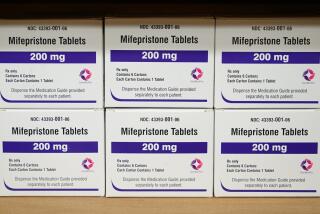Amazon jumps into drug business with PillPack acquisition, threatening to disrupt another industry
Amazon.com said Thursday it has agreed to acquire online pharmacy PillPack, confirming months of speculation that the internet retail giant would jump into the pharmacy sector and further disrupt the rapidly changing healthcare industry.
Stocks of other pharmacy chains such as Walgreens Boots Alliance Inc. and CVS Health Corp. plummeted in response, as investors feared that Amazon could quickly expand PillPack’s reach and pull sales from the established chains.
Privately held PillPack, founded in 2013, is still a relatively small player, with an estimated $100 million in annual revenue. But Amazon — with $178 billion in sales last year, exceptional technology, far-flung distribution capabilities and a history of disrupting other industries — poses a formidable threat.
In addition, PillPack already holds pharmacy licenses in all 50 states and has relationships with most major drug-benefit managers such as Express Scripts Holding Co., eliminating Amazon’s need to build those ties from scratch.
The PillPack deal “is a declaration of intent from Amazon” to charge headlong into the pharmacy business, acknowledged Walgreens Chief Executive Stefano Pessina in an analyst conference call Thursday.
PillPack sells and ships medications in presorted doses from its pharmacy in Manchester, N.H., to every state except Hawaii, mainly for customers with multiple daily prescriptions.
The firm also coordinates drug refills and renewals, confirms insurance and helps determine customer co-pays.
Terms of Amazon’s definitive agreement to buy PillPack were not disclosed. The purchase is expected to be completed in the second half of this year.
“PillPack is meaningfully improving its customers’ lives, and we want to help them continue making it easy for people to save time, simplify their lives and feel healthier,” Jeff Wilke, Amazon’s worldwide consumer chief, said in a statement.
The stocks of Walgreens, CVS and Rite Aid Corp. were all down between 6.5% and 10.5% in midday trading after the announcement.
The drop in Walgreens’ stock also weighed on the Dow Jones industrial average because the drugstore chain last week was added to the famed index of 30 companies, replacing General Electric Co. The Dow was up slightly at midday Thursday.
The PillPack deal would be the latest example of the rapidly changing landscape in the healthcare industry because of consolidation that has partly occurred in response to expectations that Amazon, led by billionaire chief executive Jeff Bezos, would soon jump into the pharmacy sector.
Health insurer Cigna Corp. agreed in March to buy Express Scripts for about $52 billion in cash and stock. That deal for the pharmacy benefit manager came four months after CVS, the nation’s largest drugstore chain, agreed to buy Cigna rival Aetna Inc. for $69 billion. And grocery operator Albertsons Cos., which also owns Vons and Safeway, announced plans in February to buy pharmacy chain Rite Aid for an undisclosed price.
In addition, Amazon and two other major U.S. companies, the bank JPMorgan Chase & Co. and billionaire Warren Buffett’s conglomerate Berkshire Hathaway Inc., in January announced a joint plan to find ways of reducing healthcare costs for their U.S. employees.
The companies said their focus would be mainly on providing improved healthcare for their own U.S. workers, who total nearly 1 million. But the move triggered speculation that any solutions they develop could quickly spread through the industry.
“Amazon’s move into drugs retailing wasn’t highly surprising to us” in part because it came “after its recent announcement of a healthcare joint venture,” Tuna Amobi, an analyst with CFRA Research, said in a note to clients.
“We view Amazon’s latest move as another well-conceived strategic foray that could provide a toehold into the traditional pharmacy benefits managers (PBMs) space, with a longer-term potential to disrupt the incumbent players,” wrote Amobi, who reiterated his “buy” recommendation on Amazon’s stock.
Daniel Ives, who tracks Amazon as head of technology research at GBH Insights, said it’s unclear how the PillPack acquisition fits into Amazon’s larger plans for the healthcare industry.
Amazon “has kept it close to the vest in terms of its overall healthcare strategy” and, for now, appears mainly to be seizing a ripe opportunity in the pharmacy sector, he said.
The PillPack deal “checks every box” and “makes a ton of sense for Amazon” because it combines PillPack’s established presence in the regulated pharmacy business with Amazon’s enormous strength in pricing, distribution and logistics, he said.
“This is Amazon’s first major shot across the bow at the healthcare players, especially on the pharmacy side,” Ives said.
Walgreen’s Pessina told the analysts that PillPack “had been for sale for a while” and that “we are not particularly worried” about Amazon’s proposed purchase, although he added that “we are not complacent.”
“We have a clear plan” to keep growing in the pharmacy business, Pessina said of his Deerfield, Ill.-based company. “We don’t see any reason to be worried.”
This isn’t the first time Amazon has used an acquisition to decisively enter an industry.
Amazon last year plunged into the U.S. grocery business by acquiring Whole Foods Market Inc., a 465-store leader in the selling of natural and organic groceries, for $13.7 billion.
Amazon since has rolled out a variety of discounts at Whole Foods for the more than 100 million members of its Amazon Prime service.
UPDATES:
11:15 a.m.: This article was updated with an industry analyst’s comments about Amazon’s strategy.
9:30 a.m.: This article was updated throughout with staff reporting and comments from Walgreens’ CEO and an industry analyst.
This article was originally published at 6:50 a.m.







